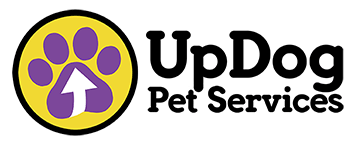Pet Pantry Picks: Safe Human Foods and Toxic No-Nos for Dogs
- UpDog Pet Services
- Oct 29, 2024
- 4 min read
Updated: Oct 23, 2025
A guide to help you safely expand your dog’s diet, with foods categorized into Good, In Moderation, and Bad lists.
Good Foods for Dogs
These foods are nutritious and safe for dogs. Be sure to introduce new foods slowly and check with your vet if you’re unsure.
Most Veggies and Non-Citrus Fruits: Many fruits and vegetables are packed with vitamins, minerals, and fiber that can benefit your dog. Some great examples include carrots, green beans, blueberries, and pumpkin (good for digestion). Double-check with our “Bad” list, as some fruits and veggies, like onions or grapes, are toxic.
Goat Milk and Goat Yogurt: Easier for dogs to digest than cow’s milk, these provide probiotics that support a healthy gut.
Meats, Fish, and Seafood: Protein-rich, these foods are excellent sources of amino acids. Stick to unseasoned, cooked meats like chicken, beef, and fish such as salmon.
Eggs: Cooked eggs are high in protein and healthy fats and can make a great snack.
Popcorn: Plain, air-popped popcorn is a crunchy treat that’s safe as long as it’s unsalted and butter-free.
Grains: Corn (off the cob only), oats, quinoa, and brown rice offer fiber and other nutrients and are safe in small amounts.
Peanuts/Peanut Butter: Natural peanut butter with no artificial ingredients is safe in small quantities. Avoid any peanut butter containing xylitol, a toxic sweetener for dogs.
Cashews and Almonds: Cashews and almonds are safe in small amounts but can be a choking hazard for some dogs, so serve them cautiously.

Healthy snacks aren’t just for humans — many fruits and veggies are great for dogs, too!
Foods to Feed in Moderation
These are safe but should be limited due to high fat, sodium, or lactose content.
Cheese: Some dogs love cheese, but it’s high in fat and can upset sensitive stomachs.
Bread (especially white bread): White bread is low in nutrients, but small amounts occasionally are okay.
Salted Meats: Foods like ham or deli meats are safe in very limited amounts but should be low in sodium.
Dairy (Pup Cups, Ice Cream): Some dogs tolerate dairy, but lactose can cause digestive issues in others. Opt for dog-friendly ice cream when possible.
Sardines: Rich in omega-3 fatty acids, sardines are healthy in small portions but high in protein, which can strain the kidneys if overfed.
Honey: A natural source of sugars and antioxidants, honey is fine in small doses but should be avoided for dogs with weight or dental issues.
Cooked Sweet Potatoes: Sweet potatoes are rich in vitamins A and C. Always cook them, and avoid giving too much due to their carb content.
Foods to Avoid (Bad for Dogs)
These foods are harmful or toxic and should never be given to dogs.
Chocolate: Contains theobromine, which is toxic to dogs and can cause vomiting, seizures, and even death.
Xylitol: A common sweetener in gum, xylitol is highly toxic to dogs and can cause severe blood sugar drops and liver failure. Watch for discarded gum!
Caffeine: Caffeine can cause rapid heart rate, restlessness, and in large amounts, potentially fatal complications.
Grapes, Raisins, and Currants: These fruits can cause sudden kidney failure.
Citrus: Citrus fruits, especially peels, can cause digestive upset and depression in dogs.
Starfruit: Toxic to dogs, especially those with kidney problems, and can lead to vomiting and neurological issues.
Unripe Tomatoes: Solanine in unripe tomatoes is toxic to dogs and can cause GI upset.
Avocado: Contains persin, which can cause vomiting and diarrhea.
Raw Potato: Raw potatoes have solanine, toxic to dogs. Always cook potatoes before offering them.
Onions, Garlic, and Chives: Can cause gastrointestinal upset and damage red blood cells, leading to anemia.
Macadamia Nuts, Pecans, and Walnuts: Toxic to dogs, causing muscle tremors and weakness.
Nutmeg: Contains myristicin, which is toxic to dogs and can lead to disorientation and seizures.
Sugar: Processed sugar can lead to weight gain, dental issues, and diabetes.
Alcohol: Even small amounts of alcohol are toxic and can lead to serious health complications.
Cooked Bones: Cooked bones can splinter and cause choking or punctures in the GI tract.
Fried Foods: High in fat and difficult to digest, fried foods can lead to obesity and pancreatitis.
Apple Seeds: Apple seeds contain cyanide, which is toxic if consumed in significant amounts.
Yeast Dough: Raw dough can expand in the stomach and cause bloating and alcohol poisoning due to fermentation.
Fatty Trimmings: Fatty cuts and trimmings from meats can cause pancreatitis, a painful and dangerous condition.
Sharing treats with your dog can be a fun part of your relationship, but knowing which foods are safe is essential. If you’re unsure about a food, it’s always best to ask your vet to avoid potential health risks. #ProfessionalDogTrainer #DogTrainingTips #CertifiedDogTrainer #DogTrainerLongIsland #DogTrainerNassauCounty #LynbrookDogTrainer #NYDogTrainer #PositiveDogTraining #DogTrainingAdvice #TrainYourDog #DogTrainingHelp #HappyDogs #DogTrainingSuccess #DogTrainerNearMe #DogOwners #DogTrainingMatters #BestDogTrainer #PositiveTraining #DogDietGuide #SafeFoodsForDogs #HumanFoodsForDogs #PetNutrition #DogHealthTips #HealthyDog #DogOwnerTips #PetSafety #FoodsDogsCanEat #ToxicFoodsForDogs #DogFriendlyFoods #PetCare101 #DogParents #CanineNutrition #DogWellness #HealthyPetDiet #DogLife #PetParenting #DogTrainingTips #HappyHealthyDogs



